RBI eases External borrowing norms to enable cheaper funds
The Reserve Bank of India (RBI) has further liberalised External Commercial Borrowings (ECB) Policy by including more sectors in the window in a bid to facilitate cheaper access of overseas funds to Indian companies.
Key Facts
RBI has stipulated uniform, all-in cost ceiling of 450 basis points (bps) over benchmark rate, which, in most cases, is six-month London Interbank Offered Rate (LIBOR). The benchmark rate for rupee-denominated bonds will be prevailing yield of government bonds of corresponding maturity.
RBI has decided to increase ECB Liability to Equity Ratio for ECB raised from direct foreign equity holder under automatic route to 7:1. This ratio will not be applicable if total of all ECBs raised by entity is up to $5 million or equivalent. Earlier, ratio exceeding 4:1 was required the RBI’s approval.
RBI also has allowed all housing finance companies regulated by National Housing Bank and Port Trusts to raise ECB under all tracks. Such entities shall have board-approved risk management policy and shall keep their ECB exposure hedged 100% at all times for ECBs raised under Track I.
RBI also has allowed companies engaged in business of maintenance, repair and overhaul and freight forwarding to raise ECBs denominated in rupee only. Funds raised through ECBs will be not allowed to be invested in real estate or for purchase of land except for affordable housing, construction and development of SEZ and industrial parks or integrated townships.
RBI also relaxed norms for foreign investment in bonds by withdrawing investment cap for investors from investing in government bonds with minimum residual maturity of three years.
External Commercial Borrowings (ECBs)
ECBs are commercial loans borrowed from foreign sources for financing the commercial activities in India. It may be bank loans, securitised instruments, buyers’ credit, suppliers’ credit, foreign currency convertible bonds, etc. It should be noted that ECBs are not FDI. In case of FDI, foreign money is used only to finance the equity Capital. But in case ECBs, foreign money is used to finance any kind of funding other than equity.
Month: Current Affairs - April, 2018


